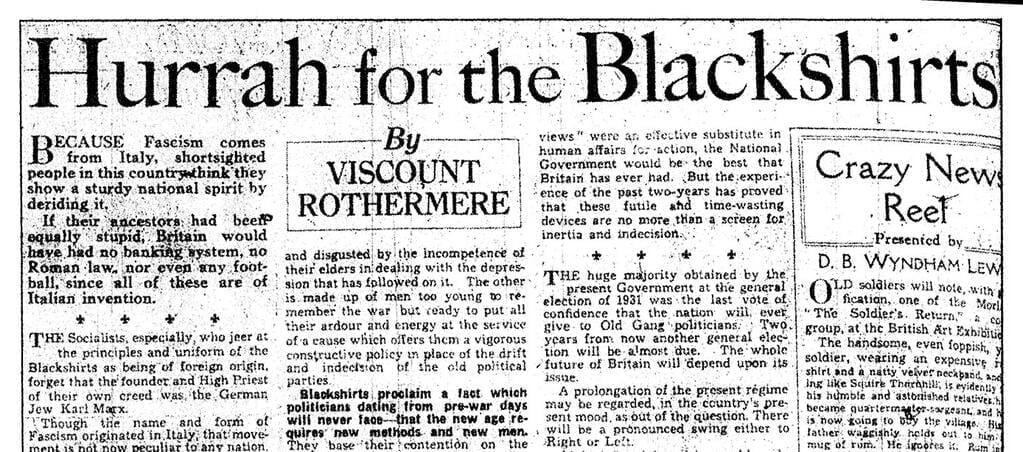The reactionary rag that is the Daily Mail, has lost its long-standing editor. But the paper will continue to be a platform for the most poisonous political ideas.
The departure of Paul Dacre as editor of the reactionary Daily Mail will not cause many tears to be shed. Despite all the praise being heaped on him as being some sort of Fleet Street legend, last of a dying breed, etc., the reality is that he was a shouting bully who only achieved results due to having an exceptionally well-staffed newsdesk. This stands in contrast to other national titles, which have seen large cuts over the years. At the end of the day, it is the reporters and journalists who actually do the work.
Dacre followed in the footsteps of his predecessors in advancing a right-wing agenda, aimed at a jingoistic, xenophobic middle class. Anyone who got in the paper’s way was brutally rubbished. Lie after lie was peddled as fact to support the right-wing line of the paper. As Polly Toynbee outlined in the Guardian newspaper last week:
“His Mail poisons the well of human kindness with anecdotes of benefit scroungers or prisoners in jail luxury, devoid of context or statistic, misleading voters to wildly overestimate sin and risk. People think 25% of UK residents are Muslim – true figure 5%. They think 25% of the benefit budget is fraud – it’s 0.7%. They wildly misjudge spending on foreign aid – it’s 1% of gross national income. His evidence-defying campaign against the MMR – measles, mumps and rubella – vaccine surely led children to go unvaccinated.”
She goes on to add:
“Women are a favoured target, the Mail acting as playground bitch, forever papping celebrities putting on weight, spotted without makeup, revealing cellulite in a bikini. The case of the Royal Navy’s Faye Turney was a classic: after she was captured by the Iranians, the Mail joined the chequebook stampede for her story, offering – according to the defence department – ‘a very substantial sum’. But when she told her story elsewhere, Dacre took revenge, savaging her as an unfit mother: a picture of soldiers’ coffins bore the headline, ‘They won’t be selling their stories’.”
Of course such comments could be made about other national titles – they are all owned by the same rich and powerful elite. But the Daily Mail under Dacre took this to new heights.
The Mail Online website was seen as a particular success, with its high level of female readership. This was despite the much-parodied endless stories about various women “flaunting their curves”.
Here we seen the first signs of Dacre’s downfall, however. Over the last period, income from the website has fallen by 4%. The paper’s strong support for Brexit has alienated certain backers, including the title’s owner: the latest Lord Rothermere. The writing has therefore been on the wall for some time.
No doubt the new editor will soften the line on Brexit, as well as pushing through some cuts, with a greater sharing of resources between the weekday and Sunday editions.
However, we should not be naive enough to believe that the Daily Mail under Dacre was some sort of exception to the rule – either for the Mail or the rest of Fleet Street.
Rise of the barons
To understand how the Daily Mail came to occupy the role it now has, we need to look back in time.
Newspapers in the 18th and early 19th century had a limited readership, aimed at the upper and professional classes. They were expensive to print and buy, had small circulations, and were usually regional in nature.
The Industrial Revolution brought a revolution in printing technology, however, and in the distribution of papers throughout the country. Print costs fell sharply.
The late 19th century saw the rise of the press barons, who saw a market for large printrun papers – with a much lower cover price – aimed at working class and lower-middle class readers.
The tone of these papers was jingoistic, reactionary (anti-trade union, hostile to radicalism), and often racist. They concentrated on scandals, crime news and other such lurid stuff, which generated a huge readership – and therefore huge profits.
One such paper was the Daily Mail, launched in 1896 by the Harmsworth family, led by the soon-to-be Viscount Rothermere.
The press barons (as they soon became known) soon realised that a mass press could not only be profitable, but also act as a means by which they could influence both the political and economic picture. A free press is only free to somebody who owns one.
Lord Northcliffe summed up the approach of the Daily Mail as: “I give my readers a daily hate”.

Reactionary rag
This would be the case throughout the whole history of the Daily Mail. During the build-up to the First World War, the paper was extremely anti-German. But a few decades later they supported Hitler and Mussolini and backed the British Union of Fascists. One Daily Mail headline from the 1930s shouted: “HURRAH FOR THE BLACKSHIRTS”.
The Mail was also consistently anti-trade union and was naturally hostile to the Russian Revolution, later reporting constant Red Scares, both real and imaginary. In 1924, they published the Zinoviev letter as an attack on the then Labour government.
The Daily Mail became a strong supporter of the Tory Party. It was said that during general elections when Thatcher was Tory leader, there was a daily direct link between papers like the Mail and Tory HQ.
Under Dacre, the only break with this was some recent support for UKIP candidates and a flirtation with New Labour under Blair.
Dacre was just continuing the method of a long line of Daily Mail editors. They hoped that their appeal to so-called Middle England would be key.
The tide begins to turn
 Times are changing, however – as the Tories found out at the 2017 general election, which served as a kick in the teeth for papers like the Daily Mail, Telegraph and Sun.
Times are changing, however – as the Tories found out at the 2017 general election, which served as a kick in the teeth for papers like the Daily Mail, Telegraph and Sun.
The average age of a Daily Mail reader is now in the mid-fifties. The paper targets those who yearn, like the Tea Party in the USA, for a return to a mythical “golden age” where things seemed good for the middle class and everybody knew their place.
But there is nothing here that appeals to youth – the next generation of newspaper buyers. In fact, the constant lies and reactionary rubbish spewed out by the likes of the Daily Mail has just served to alienate them.
The recent phone-tapping scandals have served to generate a healthy criticism of the press. But they have also promoted a belief that the solution to all the scams, lies and twisted stories spewed out by the bosses’ media machine lies in some sort of regulation – be it state-run or industry financed.
This is an illusion. So long as the press remains in the grip of big business, they will always find a way around any regulation.
The press needs to be brought under public ownership, so that views are represented on the basis not of the size of their advocates’ wallets, but on the actual support they have within society.
This is the only way to resolve the one-sidedness demonstrated so aptly by the likes of Paul Dacre and the rest of the billionaire press.






